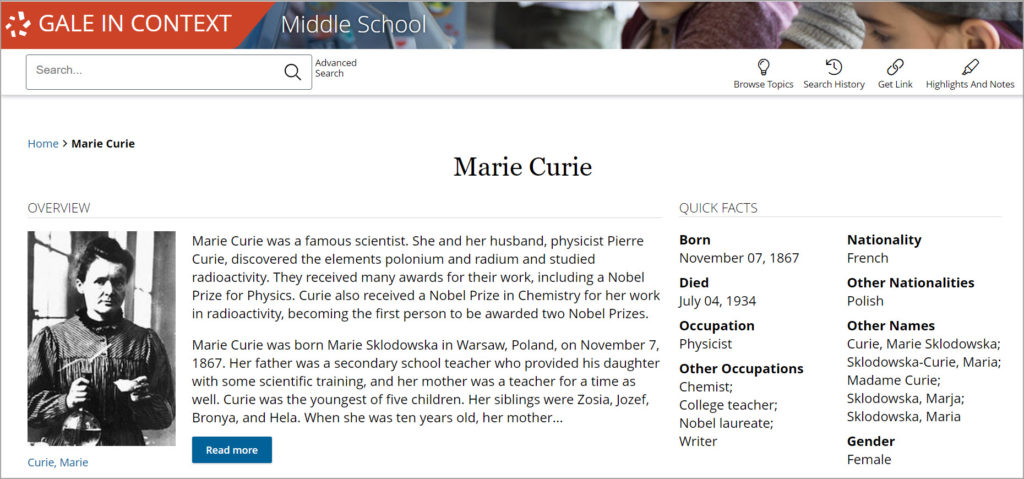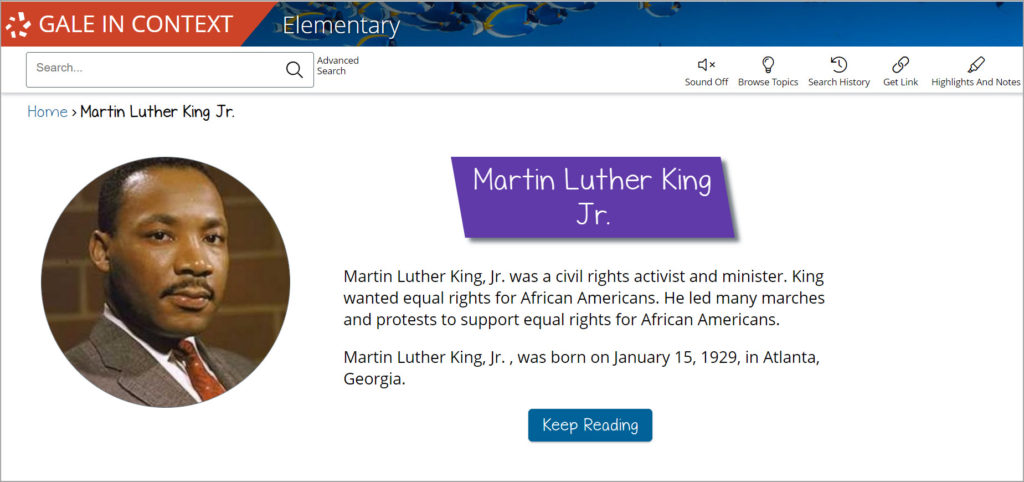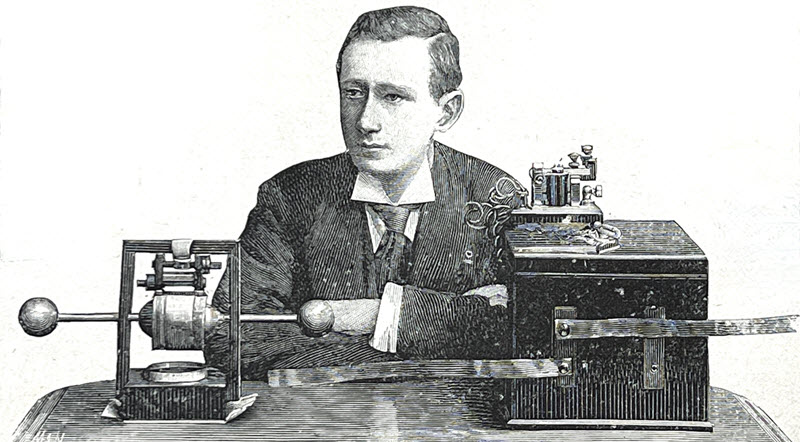| By Gale Staff |
Every educator takes great pride in inspiring students to greatness. Celebrating human achievement as a class is a powerful way to help students bond and believe that they too are capable of aspiring to great heights.
Each year on December 10, we honor Nobel Prize Day to commemorate the anniversary of the death of Alfred Nobel, the Swedish chemist, engineer, inventor, and businessman who created the Nobel Prize. The Nobel Prize is widely considered the most prestigious award a person can receive. And it’s not just one award—there are six different Nobel Prizes given out each year. Nobel Prize Day stands as a perfect opportunity to celebrate global accomplishments; recognize excellence within the various fields of science, literature, and peace; and promote a culture of learning.
If you’re interested in teaching students about the Nobel Prize and some of the incredible people it has been awarded to, Gale resources are a great place to start. Here, you can access articles, documents, videos, and more from some of the most prestigious publications in the world.
Take a Closer Look at Nobel Prize Categories
The Nobel Prize in Physics is awarded for the most important discovery or most important invention within the field of physics. Previous winners include legends like Albert Einstein, Marie Curie, and Stephen Hawking.

The Nobel Prize in Chemistry recognizes the achievements of some of the brightest minds in this field. Winners of this award are responsible for breakthroughs like the development of penicillin, the discovery of radioactivity, and the development of quantum mechanics. Previous winners include pioneers like Marie Curie and Linus Pauling.
The Nobel Prize in Physiology or Medicine recognizes the most important discovery or most important improvement within the domain of physiology or medicine. Winners of this award have made groundbreaking discoveries in the fields of medicine and physiology, including the discovery of hormones, the development of vaccines, and the discovery of how to treat malaria. Some of the most well-known winners include Alexander Fleming, Jonas Salk, and Francis Crick.
The Nobel Prize in Literature is awarded for the most outstanding work of literature. This can include anything from a novel to a collection of poems to a series of essays. Previous winners include some of the most renowned writers in history, from Toni Morrison to Ernest Hemingway.
The Nobel Memorial Prize in Economic Sciences recognizes the achievements of some of the most brilliant minds in economics. Advancements such as game theory, the development of the modern economic system, and the establishment of free trade have all been recognized with this award. Previous winners include economists like John Nash, James Mirrlees, and Amartya Sen.
The Nobel Peace Prize is awarded for the most important achievement or contribution towards the promotion of peace, reconciliation, and international understanding. Multi-cultural relations that have been established, negotiations that have taken place, and organizations that have been set up to promote peace have all been recognized with this award. Some of the most famous winners include Nelson Mandela, Malala Yousafzai, and Martin Luther King, Jr.

How to Integrate Content into Your Lesson Plans
When celebrating Nobel Prize Day in your classroom, there are several different ways you can use Gale In Context resources to help your students understand the importance of these awards and the lasting impact of Nobel Prize winners.
Elementary School Students
Introduce your students to the Nobel Prize with Gale In Context: Elementary. Discuss the different types of Nobel Prizes and ask them to imagine themselves winning one in the future—what prize would they win, and what would it be for?
Middle School Students
For middle school students, use Gale In Context: Middle School to delve deeper into the history and background of the Nobel Prize. Encourage your students to explore biographies of past winners and to research their contributions to the world. This is an excellent way to start a conversation about how to find factual information and use multi-media formats.
High School Students
For high school students, use Gale In Context: High School to explore the topic from various angles. Ask students to compare the contributions of past winners in a specific field, analyzing the development of technology and global ideas over time. Have them use critical-thinking skills to evaluate their findings, then synthesize what they have learned into an essay, project, or presentation.
Gale In Context also allows your students to access world-class content in 40+ languages. ELL students have the option to read articles and explore topics in the language of their choosing and even share that content with family members. Students also have the option to utilize the Read-to-Speak feature, which uses technology to read aloud text from any page. This can be particularly helpful for students who need accessibility support.
Teaching about the Nobel Prize is a wonderful way to introduce your students to some of the most important discoveries and achievements in science, literature, and foreign relations. By celebrating Nobel Prize Day and incorporating Gale In Context into your lesson plans, you can create a unique and engaging learning experience for your students.
Not a Gale In Context subscriber? Learn more or contact your education consultant today.

